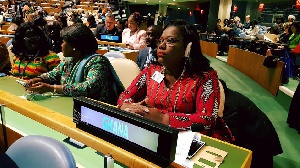 Nana Oye Lithur, Minister of Gender
Nana Oye Lithur, Minister of Gender
Ghana has acknowledged the role UNFPA and UNICEF are playing to end child, early and forced marriage.
UNFPA and UNICEF have jointly launched a Global Joint Progamme to Accelerate Actions to End Child Marriage to reaffirm the United Nation’s commitment to move towards collective action.
Nana Oye Lithur, Minister of Gender, Children and Social Protection stated at the launch of the programme in New York on the sidelines of the 60th session of the UN Commission on the Status of Women (CSW60) from March 14 to 24.
The Gender Minister noted that the Global Joint Programme was a strong indication of UNFPA, UNICEF and its partners’ commitment to safety, protection and full development of children across the world.
“It is therefore critical that we solidly sustain the voice that rejects the abuse, enslavement and gross violations of girls in our countries and on our continent, and indeed globally, through the practice of child, early and forced marriage.
“We have a crisis on our hands. The 15 million girls that are estimated by the UN to experience child, early and force marriage each year is more than half the population of my country. The statistic telling and the facts are glaringly painful,” Nana Oye Lithur noted.
She noted: “there is no doubt that this initiative will yield great results towards the prevention and total elimination of child marriage in the world.
“Ghana looks forward to being an active part of the Global Joint Progamme as we accelerate actions to end child marriage”.
Nana Oye Lithur noted that while the world invest in prevention, it’s crucial to provide a second chance and opportunities for married girls and teen moms - education, health and economic opportunities.
“The real solutions lie also with the young women and young people themselves. We must move from vulnerability to voice and leadership.
“Africa is young, innovating and this energy must be harnessed to ensure that we have lasting solutions. Indeed child marriage is a human rights, human security, governance and development agenda,” she noted.
Responding to issues raised on punishment of perpetrators, Nana Oye Lithur who is a human right lawyer by profession and a gender advocate, noted that the element of punishment of perpetrators as deterrence from continuing the practice was extremely important to the over-all and holistic strategy to fight and end child marriage.
“The act of child marriage, the process of child marriage and various activities associated with it, do constitute punishable and in many cases criminal acts.
“All countries must therefore match their commitments with aggressive enforcement of these provisions,” she said.
The Gender Minister explained that some countries have also provided specific punishment for perpetrators of child marriage.
Promising Practices: Norway’s Penal Code (2003) punishes forced marriage as a felony against personal liberty. Scotland passed the Forced Marriage Act of 2011, which criminalizes forced marriage.
The Act empowers courts to issue protection orders tailored to victim's needs, and makes violation of those orders a criminal offense. December 2011, Pakistan passed the Prevention of Anti-Women Practices Bill and the Criminal Law Bill, which amended the Pakistan Penal Code and the Code of Criminal Procedure.
The Prevention of Anti-Women Practices Bill Prevention of Anti-Women Practices Bill makes it unlawful to “compel or arrange or facilitate” a women’s marriage, punishing violations with imprisonment of three to seven years and a fine.
Nana Oye Lithur said in 2007, the Government of Sierra Leone, enacted the Child Rights Act, which establishes the age of 18 as a minimum for marriage, regardless of whether the marriage is carried out under formal, customary, or religious law.
“The law further specifies 18 as the minimum age to be betrothed (promised for marriage) or to be the subject of a dowry transaction indicating that any person found in violation of this provision has committed a criminal offense and may be subject to a fine of up to 30 million Leones or a prison term of no more than two years or both,” she said.
However, like many other countries in the sub-region, implementation of this aspect of the law has been challenging and that is where Ayisha’s question comes in.
She said there exist conflict between the applications of formal law versus customary laws, where majority of the population view the traditional, customary system as the primary source of authority for their actions.
“As a people we need to remain resolute in our commitment to end this practice and other harmful traditional values. As we work tirelessly to engage with our traditional and cultural systems to ensure positive change in behaviour towards the girl-child and women in general, it is important that we set the right examples by applying the law where evidence is available.
“As we work at punishment as a deterring factor to child marriage, it is important that we continue to invest in our youth; to continue to pay attention to our young girls; ensure that they are educated, informed and empowered to make the right decisions,” she said.